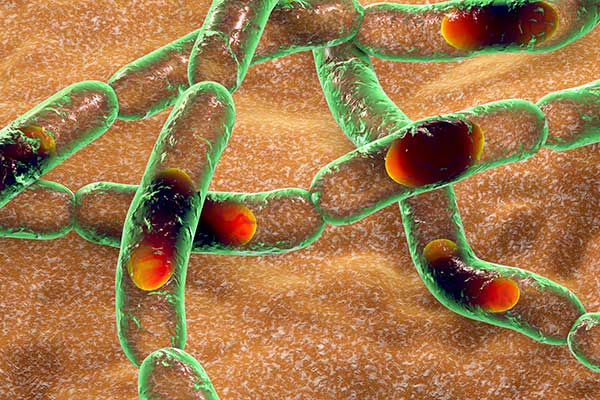Health
Nigeria Confirms Anthrax Outbreak — Safety Tips

The Federal Ministry of Agriculture and Rural Development (FMARD) has confirmed one case of Anthrax disease in a mixed livestock farm in Niger State.
This is the first animal case to be reported in Nigeria since the beginning of the West Africa outbreak in Ghana in June 2023.
According to the Ministry, on 13th July 2023, the sudden deaths of livestock in the Niger farm with eight (8) mortality was reported. In addition, the animals who died were observed to have been bleeding from external orifices without blood clotting.
What is Anthrax?
Anthrax is a severe disease caused by the bacteria – Bacillus anthracis. It can affect both humans and animals, including wild animals and livestock such as cows, pigs, camels, sheep, goats, etc.
The bacteria, which exist as spores, can be found in the soil, wool, or hair of infected animals. Anthrax spores are resistant to extreme conditions and can survive in the soil or environment for decades, making controlling or eradicating the disease very difficult. The spores are brought to the surface by wet weather, by deep digging, or when eaten by livestock or wild animals when they graze.
Anthrax affects humans in three ways:
- Skin infection, i.e., direct contact with infected animals through wounds or cuts
- Gastrointestinal, i.e., through eating raw or undercooked meat of infected animals or their products including milk.
- Inhalation, i.e., breathing in the spores (the deadliest form of the disease)
- Identification and investigation of all the exposed persons and animals/farms is ongoing, we urge members of the public to have a high index of suspicion and report if they observe any of the following symptoms in animals or persons around them:
- In animals, anthrax can cause symptoms such as high fever, weakness, loss of appetite, bleeding from all body openings (nose, mouth, ears, anus etc.), swelling and difficulty in breathing and bloody diarrhoea. It can lead to sudden death in most cases. The blood of an animal with anthrax DOES NOT CLOT on slaughter. Also, at slaughter, marked bloating and quick decay are observed.
- In humans, depending on the type (described above) and route of infection, anthrax can cause fever, painless skin sores with a black centre that appears after the blisters, general body weakness, and difficulty in breathing. It can also cause severe digestive illness that resembles food poisoning.
Persons at risk of contracting anthrax
- People who handle animals, i.e., veterinarians, veterinary laboratory workers, farmers, abattoir workers, butchers, cattle rearers, livestock producers and traders, wildlife handlers, hunters, park rangers, processors, importers, and exporters of hide and skin, animal health workers etc.
- People who consume animals (cattle, sheep, and goats) that were found dead
- Healthcare workers, diagnostic laboratory workers and caregivers who are exposed to patients or their biological specimens.
- Law enforcement officers (Police, Military, Immigration, Customs, Point of Entry Personnel etc.).
- Anyone travelling to a location with a confirmed anthrax case within and outside Nigeria.
Public Health Advisory
- Exercise caution when buying animals – cows, camels, sheep, goats, and other livestock – from Nigerian states bordering Benin, Chad, and Niger, and from Ghana and Togo via waterways.
- Carefully observe livestock to be slaughtered for consumption or sale for signs of ill health before slaughtering.
- Do not slaughter animals (cattle, sheep, and goats) at home, rather make use of abattoirs or slaughter slabs.
- Avoid contact with meat/bush meat or animal by-products such as skin, hides (“kpomo”) and milk of a sick or dead animal.
- Do NOT SLAUGHTER sick animals. Slaughtering the sick animal can cause significant exposure with risk of inhalation of the bacteria by humans around at the time.
- Do NOT EAT products from sick or dead animals.
- Hunters SHOULD NOT pick sick or dead animals from the bush or forest to be sold for human consumption.
Health Advisory for Healthcare Workers
All animal health professionals/handlers and healthcare workers must maintain infection prevention and control precautions, a high index of suspicion/vigilance and notify the health authorities (both human and animal) when they see any human or animal with the above-stated symptoms.
Health Advisory for Livestock Owners
- Vaccination is the most effective preventive measure against anthrax in livestock. Consult with a veterinarian to develop a vaccination schedule suitable for your specific livestock.
- Use personal protective equipment (gloves, facemasks, goggles, boots) when handling sick animals.
- Do not slaughter sick animals. Slaughtering sick animals can expose the anthrax spores which humans can inhale which will cause severe manifestations of the disease.
- Regularly monitor livestock for any sign of sickness or unusual behaviour.
- Immediately report cases of animals bleeding from body openings to veterinary authorities, or agriculture extension workers. Note: The blood of an animal with anthrax DOES NOT CLOT.
- DO NOT PROCESS or MOVE THE DEAD or SICK ANIMAL, QUICKLY REPORT to your VETERINARY DOCTOR or VETERINARY AUTHORITIES at the Ministry of Agriculture in your state.
- Maintain good hygiene practices on the farm through regular cleaning and disinfection of animal housing, feeding equipment, and water troughs.
- Practice biosecurity measures, such as controlling access to the farm, restricting the movement of animals, and disinfecting vehicles and equipment entering and leaving the premises.
- Ensure a clean and safe water supply for livestock and avoid using water from stagnant sources.
- Sick animals should be isolated and strict quarantine measures implemented to prevent the spread of anthrax to other animals or humans.
- Report all human exposures to animals with anthrax so that preventive treatment can commence if indicated.
Early detection and reporting of suspected anthrax cases in animals or humans is important for implementing effective control measures.


